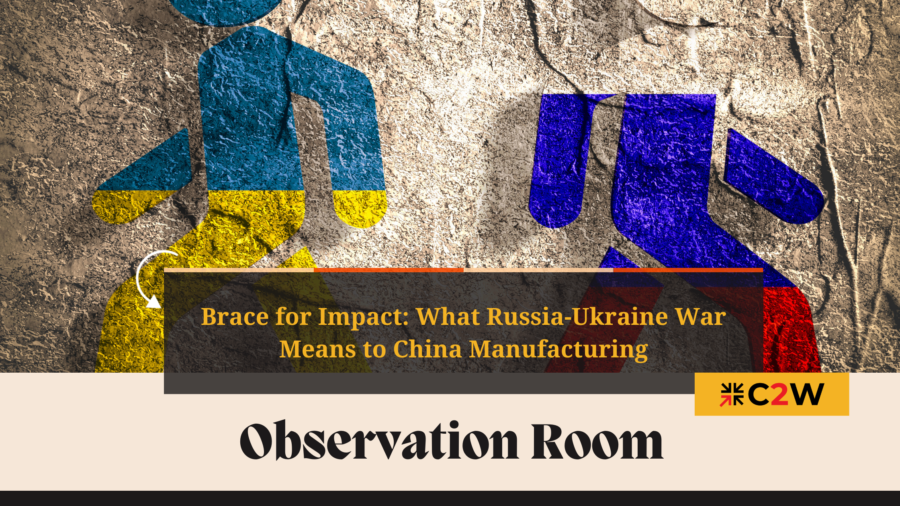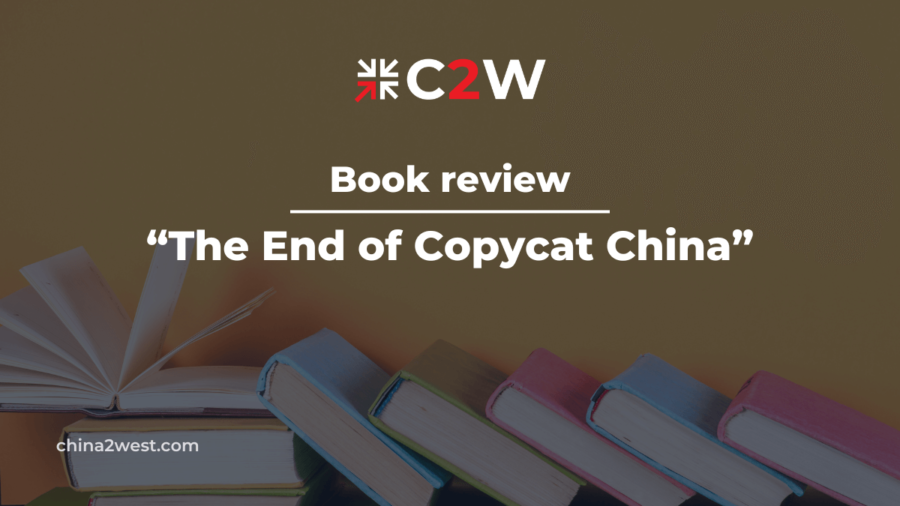The fighting between Russia and Ukraine still ravages, and detrimental impacts on global economy are pretty much just right around the corner. China manufacturing is such a critical part of global supply chains, which had just made some delightful recovery from the pandemic and now once again fallen prey, that there’s no way it’d ever be spared by sheer luck. Even the top guns of Chinese commerce have cited recent geopolitics as a risk against its Belt and Road Initiative, [i] China’s ambitious plan of international infrastructure and trade across the Eurasian Continent.
The disruptions may not be immediately impactful, given the complexity of the situation. For China manufacturing, every sector of the economy, expectedly or unexpectedly, can play a part in shaping its course for the next few years, even in the long run.
Supply Chain Crisis Escalates
This should be the most expected and direct outcome of the war. It is not just the direct trade with both/either one of the countries being jeopardized, but also that with other countries. Please keep in mind that the current supply chain crisis may have been eased, but it is not over yet. We are still short of containers and ports around the world are still experiencing backlogs.
But this time, the war may cause a bigger shortage of manning, as Russian and Ukrainian seafarers make up 14.5% of global shipping workforce while shipping currently accounts for 90% of global trade transportation, according to the International Chamber of Shipping. [ii] Their absence from work can greatly disrupt supply chains.
This issue has actually been existing since the pandemic as many seafarers have had trouble commuting to or switching their shifts due to difference of covid restrictions. But in the meantime, there’s also another thing to add insult to injury. The SWIFT bans on Russia have made it extremely difficult to process payments for international seafarers, especially those of the two concerning nationalities. This impact is not very much present for now, but industry insiders think it is just a matter of time.[iii]
Currency Fluctuations
Ever since the military operations against Ukraine, the global currency market has been in turmoil on a daily basis, with all the major currencies tumbling[iv], except one-Chinese Yuan. Yuan was close to a four-year high against other currencies, including US dollars. Experts seem to be optimistic about its resilience and strength during the crisis, calling it a “a safe haven for trade”.[v]
A strong Yuan might be a product of increased trade transactions between China and Russia due to the western financial sanctions against the latter, but it is not necessarily good news for China exports. Appreciation of RMB will unavoidably raise prices for overseas importers, especially given the already high logistic fees for lack of containers and shipping crews.
But some encouraging trade policies and partnerships with other countries might be able to offset some of the negative impacts. China’s ongoing push for the Free Trade Zones as well as trade agreements, such as RCEP(Regional Comprehensive Economic Partnership), has given positive signals for foreign investment into Chinese manufacturing sector, which is backed up by Chinese Ministry of Commerce.[vi]
Shortages of Raw Materials and Chips
According to reports by Goldman Sachs, Russia accounts for China’s 17% of lumber and 16% of oil imports. [vii] Although China has been making efforts to diversify its sources of energy for years, experts see this current geopolitical turmoil as a wakeup call for China to maintain its energy independence, [viii] which might cause a lasting shortage of certain raw materials also stemming from the unfavorable relationships between China and western nations.
But the chip shortage is extra severe here. As the world has already been grappling with this shortage as a result of COVID and escalating tensions between the US and China leading to sanctions, the war only makes the matter worse. Russia and Ukraine are both key suppliers of neon gas and palladium, which are critical materials to produce semiconductor chips. [ix]
Although large chip companies have reassured businesses with the optimism for limited disruption on chip supply from the situation, owing to the stockpiling of materials and variety in procurement sources. The US government still urges concerned businesses to prepare by diversifying their chip supply chains for possible retaliations by Russia of blocking access to these materials. ix
China never shies away from its ambition of industrial upgrades into a more advanced fashion. The current severing bottleneck in chip supplies undisputedly hinders many Chinese manufacturers, even for big names like Huawei. For western manufacturers, the risks lie in related sanctions by the US. In light of the situation, Chinese Ministry of Commerce offers security credit insurance for trade activities to shell from financial loss caused by such political disputes. [x]
The best scenario will, of course, be that all countries sit down and talk it out. But no one can assure if that’s going to happen and given the escalating tensions such optimism can’t be fully afforded. But you can afford to protect yourself as best as you can from the aforementioned negative impacts.
With the British background and China base of China2West as well as our international bilingual team members and 3PL services worldwide, it is a great option to enjoy quality of China manufacturing and hassle-free process, leaving worries about our world to us. If interested, please feel free to contact us.
[i] http://www.ce.cn/xwzx/gnsz/gdxw/202203/01/t20220301_37365665.shtml
[ii] https://www.ics-shipping.org/press-release/russian-and-ukrainian-seafarers-make-up-14-5-of-global-shipping-workforce-according-to-ics/
[iii] http://www.cb.com.cn/index/show/zj/cv/cv135152491269
[iv]https://www.ecb.europa.eu/stats/policy_and_exchange_rates/euro_reference_exchange_rates/html/index.en.html
[v] https://www.scmp.com/economy/economic-indicators/article/3168226/chinas-yuan-trading-safe-haven-currency-ukraine-crisis?module=inline&pgtype=article
[vi] https://economy.caixin.com/2022-03-01/101848836.html
[vii] https://cn.reuters.com/article/russia-ukraine-war-china-trade-0301-idCNKBS2KY32F
[viii] https://www.scmp.com/economy/china-economy/article/3168835/ukraine-russia-crisis-tests-beijings-desire-maintain-normal?module=perpetual_scroll_1&pgtype=article&campaign=3168835
[ix] https://www.cnbc.com/2022/02/24/russian-invasion-of-ukraine-to-further-strain-us-chip-supply.html
[x] https://economy.caixin.com/2022-02-24/101846512.html


